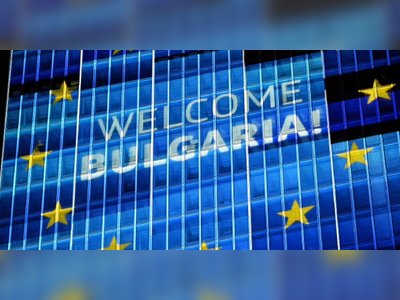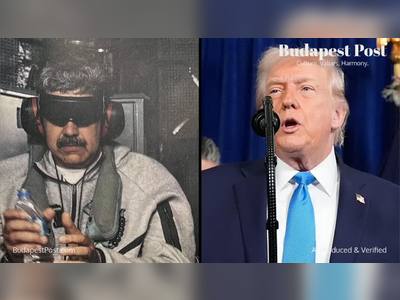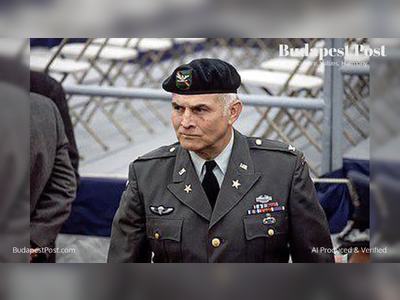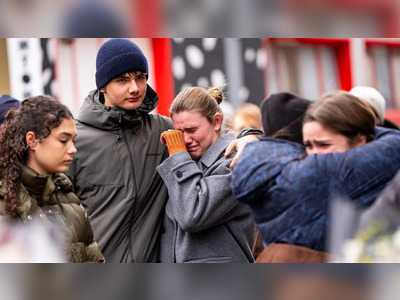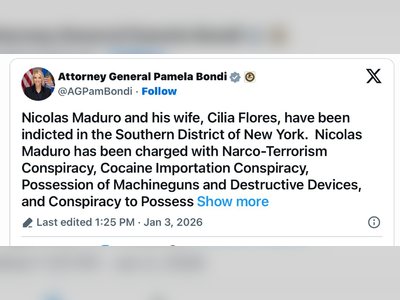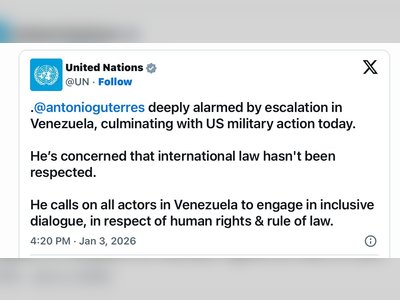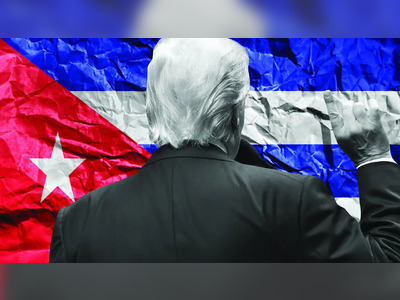Ukraine and the United States Agree on Ceasefire Proposal Amid Renewed Military Support
High-level discussions in Saudi Arabia result in Ukraine's acceptance of a ceasefire and the resumption of U.S. military aid.
High-ranking officials from Ukraine and the United States engaged in negotiations in Jeddah, Saudi Arabia, following contentious events in Washington.
Andriy Yermak, head of the Ukrainian delegation, stated that their discussions aimed to forge a fair and lasting peace in Ukraine.
The talks, which lasted several hours, culminated in Ukraine accepting the U.S. ceasefire proposal, while the United States pledged to restart military and intelligence support for Ukraine.
The meeting marked the first U.S.-Ukrainian interaction since a scandal erupted involving U.S. President Donald Trump and Ukrainian President Volodymyr Zelensky that led to the suspension of military assistance to Kyiv and a reduction in intelligence sharing during Ukraine's ongoing defensive struggle against Russia.
Previously on February 28, Zelensky and Trump had convened at the White House to sign a bilateral agreement concerning Ukrainian natural resources.
However, the meeting devolved into a confrontation, with Zelensky facing accusations of disrespect and ingratitude, culminating in a breakdown of U.S.-Ukrainian relations.
This incident had historically strained ties, prompting both nations to seek to ease tensions since then.
The Jeddah meeting's agenda focused on achieving a partial ceasefire and exploring realistic pathways to peace.
Yermak led the Ukrainian delegation, which included Pavlo Palisya, deputy head of the presidential office, Foreign Minister Andriy Sybiha, and Defence Minister Rustem Umerov.
President Zelensky was in Saudi Arabia as a guest of the Crown Prince but did not take part in the U.S.-Ukrainian negotiations.
Representing the American side were Secretary of State Marco Rubio, National Security Advisor Mike Waltz, and Middle Eastern Special Envoy Steve Witkoff.
Reports indicated that Witkoff would also visit Moscow following the meeting.
Ahead of the negotiations, reports circulated that the central topic would revolve around a ceasefire and viable peace arrangements.
Yermak expressed optimism on his Telegram channel, stating that Ukraine was prepared to discuss a ceasefire and that the current day would pivot towards constructive dialogue.
During the discussions, Rubio emphasized that Ukraine must be willing to cede certain territories for peace, arguing that this is the sole path to concluding the Russian invasion.
On the same day, Ukraine launched what was described as its largest drone attack against Moscow, leading to the downing of 69 drones according to Moscow's mayor, which resulted in three fatalities and multiple injuries.
As negotiations unfolded, Rubio remarked positively on their progress.
Yermak reiterated Ukraine's openness to dialogue and the necessity of security guarantees, discussing the importance of initiating the peace process.
Following extensive dialogues, Ukrainian officials stated readiness to accept the U.S. proposal for an immediate, temporary ceasefire lasting 30 days, extendable by mutual agreement, contingent upon Russia's acceptance and adherence.
In a joint statement, the U.S. affirmed the immediate resumption of intelligence sharing and the revitalization of security support to Ukraine after the ceasefire's acceptance.
This proposal aims to halt hostilities and foster discussions to resolve the conflict sustainably.
The summit concluded with pledges to define the negotiating teams' composition and commence talks to achieve a lasting peace, which would ensure Ukraine's security.
The U.S. committed to discussing concrete proposals with Russian representatives, ensuring European partners would also be involved in the peace process.
Recent discussions highlighted several crucial conditions that need to be met to ensure a lasting agreement, including establishing credible guarantees for future ceasefire agreements and enhancing sanctions against Russia.
There was also a focus on humanitarian efforts, including prisoner exchanges and the return of forcibly displaced Ukrainian children.
After the successful meeting, President Zelensky briefed the media, acknowledging the constructive nature of the talks while outlining three key points Ukraine envisaged for peace: a cessation of aerial attacks, maritime tranquility, and trust-building measures centered on the release of hostages.
Zelensky expressed gratitude towards Trump and the United States for enabling significant progress towards peace initiatives.
Andriy Yermak, head of the Ukrainian delegation, stated that their discussions aimed to forge a fair and lasting peace in Ukraine.
The talks, which lasted several hours, culminated in Ukraine accepting the U.S. ceasefire proposal, while the United States pledged to restart military and intelligence support for Ukraine.
The meeting marked the first U.S.-Ukrainian interaction since a scandal erupted involving U.S. President Donald Trump and Ukrainian President Volodymyr Zelensky that led to the suspension of military assistance to Kyiv and a reduction in intelligence sharing during Ukraine's ongoing defensive struggle against Russia.
Previously on February 28, Zelensky and Trump had convened at the White House to sign a bilateral agreement concerning Ukrainian natural resources.
However, the meeting devolved into a confrontation, with Zelensky facing accusations of disrespect and ingratitude, culminating in a breakdown of U.S.-Ukrainian relations.
This incident had historically strained ties, prompting both nations to seek to ease tensions since then.
The Jeddah meeting's agenda focused on achieving a partial ceasefire and exploring realistic pathways to peace.
Yermak led the Ukrainian delegation, which included Pavlo Palisya, deputy head of the presidential office, Foreign Minister Andriy Sybiha, and Defence Minister Rustem Umerov.
President Zelensky was in Saudi Arabia as a guest of the Crown Prince but did not take part in the U.S.-Ukrainian negotiations.
Representing the American side were Secretary of State Marco Rubio, National Security Advisor Mike Waltz, and Middle Eastern Special Envoy Steve Witkoff.
Reports indicated that Witkoff would also visit Moscow following the meeting.
Ahead of the negotiations, reports circulated that the central topic would revolve around a ceasefire and viable peace arrangements.
Yermak expressed optimism on his Telegram channel, stating that Ukraine was prepared to discuss a ceasefire and that the current day would pivot towards constructive dialogue.
During the discussions, Rubio emphasized that Ukraine must be willing to cede certain territories for peace, arguing that this is the sole path to concluding the Russian invasion.
On the same day, Ukraine launched what was described as its largest drone attack against Moscow, leading to the downing of 69 drones according to Moscow's mayor, which resulted in three fatalities and multiple injuries.
As negotiations unfolded, Rubio remarked positively on their progress.
Yermak reiterated Ukraine's openness to dialogue and the necessity of security guarantees, discussing the importance of initiating the peace process.
Following extensive dialogues, Ukrainian officials stated readiness to accept the U.S. proposal for an immediate, temporary ceasefire lasting 30 days, extendable by mutual agreement, contingent upon Russia's acceptance and adherence.
In a joint statement, the U.S. affirmed the immediate resumption of intelligence sharing and the revitalization of security support to Ukraine after the ceasefire's acceptance.
This proposal aims to halt hostilities and foster discussions to resolve the conflict sustainably.
The summit concluded with pledges to define the negotiating teams' composition and commence talks to achieve a lasting peace, which would ensure Ukraine's security.
The U.S. committed to discussing concrete proposals with Russian representatives, ensuring European partners would also be involved in the peace process.
Recent discussions highlighted several crucial conditions that need to be met to ensure a lasting agreement, including establishing credible guarantees for future ceasefire agreements and enhancing sanctions against Russia.
There was also a focus on humanitarian efforts, including prisoner exchanges and the return of forcibly displaced Ukrainian children.
After the successful meeting, President Zelensky briefed the media, acknowledging the constructive nature of the talks while outlining three key points Ukraine envisaged for peace: a cessation of aerial attacks, maritime tranquility, and trust-building measures centered on the release of hostages.
Zelensky expressed gratitude towards Trump and the United States for enabling significant progress towards peace initiatives.
AI Disclaimer: An advanced artificial intelligence (AI) system generated the content of this page on its own. This innovative technology conducts extensive research from a variety of reliable sources, performs rigorous fact-checking and verification, cleans up and balances biased or manipulated content, and presents a minimal factual summary that is just enough yet essential for you to function as an informed and educated citizen. Please keep in mind, however, that this system is an evolving technology, and as a result, the article may contain accidental inaccuracies or errors. We urge you to help us improve our site by reporting any inaccuracies you find using the "Contact Us" link at the bottom of this page. Your helpful feedback helps us improve our system and deliver more precise content. When you find an article of interest here, please look for the full and extensive coverage of this topic in traditional news sources, as they are written by professional journalists that we try to support, not replace. We appreciate your understanding and assistance.

